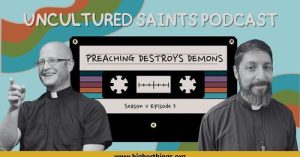Sermon Luke 17:11-19 Proper 23C
It seems kind of strange that we have this Gospel reading today. In another month it will be the Gospel reading for Thanksgiving. Talk about mixing up seasons! It’s kind of like when you go to Walmart now for Halloween decorations and you have to wade through the Christmas stuff to find anything.
But because this is the Thanksgiving Gospel reading, it is often held up as a mere object lesson. We tell this story to each other like we would to a child by saying, “See, Jesus always wants you to say thank you.” Now come on. If that is all this text is about then let’s pop in a Barney DVD and learn how to have good manners. There is far more to learn here than just learning to say thank you or even what it means to be thankful.
We set the scene with Jesus going into the midst of Samaria and Galilee. Hey, how about that? Incarnational language. God is in the midst of His creation. We do not worship a God who is afar off or at a distance. He is with us in the flesh.
Ten lepers are standing at a distance crying out for Jesus to mercy them. Yeah, you heard that correctly. In the Greek mercy is a verb. It is an action. “Jesus mercy me!” is the cry of the Gospels. And even though they are at a distance, Jesus hears them, sees them, and answers them. He comes to them in their uncleanliness and with a word makes them clean.
He tells the lepers to go to the priests at the Temple and present themselves for inspection so that they can be declared clean and rejoin society. Notice a couple of things here. First, Jesus makes the guys go to the priests. During the time of Jesus ministry, He might have gone round and round with the Pharisees and their teachings, but He never once criticized rites and ceremonies that went on at the Temple. Why is that? Well, He’s the one who set it all up in the first place. He is the one who commanded Israel to offer sacrifices at the Temple so that they would be cleansed from their sins and He also commanded lepers to present themselves to the priests so that they would be declared clean. Which leads to a second observation. In the Scriptures, cleanness is declared by someone other than yourself. Whether that means being declared clear of skin diseases or cleansed of your sins. Your salvation comes from outside of you.
But oh how we love to take this task upon ourselves. You have heard the comment or maybe even made it yourself, “Well, I’m a pretty good person overall. Sure I have some faults, but I do my best and I know God see that the good outweighs the bad.” Repent of such thinking. Repent of such arrogance, that you think you can stand before God and bargain with Him and in turn, declare yourself clean and worthy. Get over yourself!
Look at the text. ALL the lepers were cleansed. Even the ones who did not come back. This foreshadows Christ’s death which forgives all the sins of all mankind, whether they acknowledge it or not. Christ did not die for just a few who would believe, ALL sins were atoned for. From the speck in your brother’s eye to the plank in your own eye. Christ cleansed all 10 lepers. The cleansing was not dependent upon their coming back and giving thanks. They cried out for mercy to the one who can show them mercy and cleanse them. Don’t come down too hard on the 9 who did not come back. After all, they did just what Jesus told them to do.
But we can also learn what the Christian life is like by seeing how this Samaritan responds, for his actions mirror our own. Recognizing that he has been cleansed, the text says that he returns to Jesus glorifying God and falling at Jesus’ feet. Now an interesting word here, that word, ‘returned’. It is also the same word translated as repentance. Listen to this translation: “One from them, beholding that he was cured, repented with a great cry glorifying God.” It seems as though repentance is what glorifies God. Listen again: “He repented with a great cry glorifying God.”
Dear brothers and sisters, glorifying God is receiving what God has to give to us. Glorifying God is repenting of your sins and receiving the absolution that you are forgiven all of your sins. In Greek, repentance literally means to turn or return. This is who we are as Christians. We are constantly being returned to the Lord. Of Martin Luther’s 95 Theses, the first one sets the stage; “When our Lord and Master Jesus Christ said, “Repent” (Mt 4:17), he willed the entire life of believers to be one of repentance.”
And just so we are clear here, returning to the Lord, or repenting is not some hurdle you have to jump in order to get on God’s good side. As we know from the Scriptures and from the Confessions that repentance is also the Lord’s work upon us. Repentance has two parts. The first is contrition, sorrow over the sins you have committed, the confession of sins. Even the world gets this part. When someone does something wrong they fall all over themselves confessing their sins and try to make up for the wrong they have committed.
But what is unique to Christianity is the second part of repentance that makes it a work of God, and that is faith. Contrition and faith are the two parts of repentance. In other words, confession and absolution. For us, the confession of sins is not the big thing, it is the anticipation of the absolution. Only the Christian can look to the absolution, to the forgiveness of sins, to find comfort and relief. The world will rely on their own efforts to try to make amends, but it is the Christian who looks to the saving work of Christ. His life and death have paid for our sins and we participate in that forgiveness by faith. Faith is always receptive.
Go back to our Samaritan friend here. He is on his face eucharisting Jesus. Eucharist is the word for thanksgiving. Like this man, we come to the Eucharist, to Holy Communion, and are at the feet of Jesus. Jesus asks where the other 9 are. Not necessarily to condemn them somehow, but because His desire is that all people be saved and feast at His supper which is how God is glorified. Our Lord desires to say to all mankind what He says here to this Samaritan, “Rise up or resurrect, your faith has saved you.” Folks that what the Holy Supper does! That is why we have this connection in our text between eucharisting Jesus and hearing the words, ‘rise up, your faith has saved you.’ You feed upon the fruits of the cross. You feed upon the Body and Blood of Jesus and it gives you forgiveness. It resurrects you….each….and….every….time. Faith receives what the Lord has to give and it therefore saves you and resurrects you.
This whole narrative is a snapshot of salvation. Like the lepers you were once far off and our Lord sought you out and with His Water and His Word cleansed you. You are declared clean, you are forgiven. And as Christians, you turn or return to the Lord daily by confessing your sins and receiving His absolution. You kneel at His feet in the Holy Supper eucharisting Him, which entails bodily receiving Him, and therefore receiving forgiveness, eternal life and salvation. In the Sacrament of the Altar you are resurrected. Your faith strengthened. Not strengthened so that you can go out wield faith like some kind of instrument or weapon, remember faith is receptive. Rather, your faith is strengthened so that you can return like this leper and receive even more of God’s grace. Returning time and time and time again, until the end of time. To receive God’s grace by faith is how remain in the faith. To receive God’s grace by faith is to receive Jesus Himself, who on your behalf, glorifies the Father. So receive and be forgiven. Receive and be resurrected.



